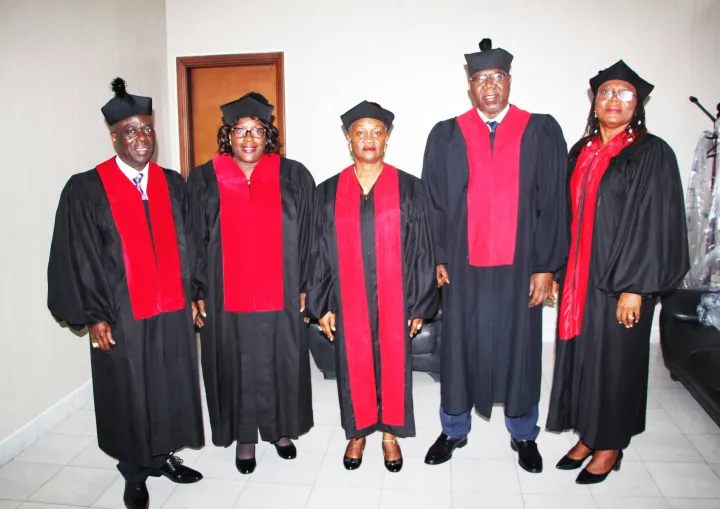The 2025 Law Day celebration in Liberia, themed “Justice, Accountability, and Inclusion: Building a Stronger Liberia Under the Rule of Law,” was marked by a significant and unprecedented absence: the entire bench of the Supreme Court, including Chief Justice Sie-A-Nyene G. Yuoh, boycotted the event. This conspicuous absence stemmed from a burgeoning conflict between the Supreme Court and the Liberian National Bar Association (LNBA) over the Court’s ruling on a contentious legislative leadership dispute. The Chief Justice’s planned delivery of the Law Day message was canceled, with no official explanation provided for the Court’s boycott, leaving attendees to speculate about the deepening rift within the nation’s legal system.
The controversy ignited when Speaker J. Fonati Koffa filed a Bill of Information with the Supreme Court, seeking clarification on his legitimacy as Speaker of the 55th Legislature, challenged by a rival faction that elected Representative Richard Nagbe Koon. The Court’s ruling in December 2024 affirmed Speaker Koffa’s legitimacy, citing Articles 33 and 49 of the Constitution, and declaring any legislative actions taken outside of these constitutional provisions as ultra vires. This decision was further reinforced in April 2025, invalidating sessions held without Speaker Koffa’s presence. However, the LNBA, led by Cllr. Bornor M. Varmah, publicly criticized the Court’s intervention, arguing that the Bill of Information, a tool designed for clarification, was improperly used to issue a second substantive ruling, effectively re-litigating the matter.
The LNBA’s criticism of the Supreme Court’s handling of the legislative leadership dispute centered on the perceived expansion of the Court’s authority through the use of a Bill of Information. Cllr. Varmah contended that the Court overstepped its bounds by employing this procedural mechanism to issue a second substantive ruling, effectively re-litigating a matter already addressed. This action, according to the LNBA, not only undermined the established purpose of the Bill of Information but also potentially jeopardized the legitimacy of government actions, including the 2025 National Budget, potentially leading to the nullification of government transactions and salaries. This concern raised the specter of a “criminal subversion of the government,” a stark warning that further fueled the tension between the Bar and the Court.
Adding fuel to the fire, Cllr. Varmah’s public condemnation of the Supreme Court triggered internal dissent within the LNBA and sparked a wider public debate. Critics accused the Bar of disrespecting the judiciary and undermining its authority, while others defended the Bar’s right to speak out on matters of legal principle. This public disagreement exposed a deeper divide within the legal community and brought to the forefront concerns about the balance between respecting judicial authority and maintaining the independence of the Bar to critique judicial decisions. The clash highlighted the delicate relationship between these two key pillars of the legal system and underscored the potential consequences of public disagreements within the legal fraternity.
Former Chief Justice Gloria Musu Scott delivered a forceful rebuke to Cllr. Varmah’s public criticism of the Supreme Court during the Law Day celebration. Emphasizing the principle of judicial finality, she asserted that the Court’s decisions must be respected, regardless of personal opinions. Describing herself as an “elder of the land,” Cllr. Scott cautioned against the politicization of legal institutions and warned the Bar against venturing into political territory under the guise of legal advocacy. She invoked the legal principle that prohibits lawyers from undermining the integrity of the Court, urging the LNBA to exercise restraint and uphold the dignity of the legal profession. Her intervention underscored the importance of upholding the rule of law and respecting the authority of the judiciary, particularly in a fragile democracy.
The Supreme Court’s boycott of the Law Day event, combined with the public exchange of criticisms between senior members of the legal community, has raised concerns about the fragility of democratic norms in post-conflict Liberia. This year’s Law Day, traditionally a celebration of legal principles and unity within the justice sector, served instead to highlight deep fractures within the nation’s legal system. The discord signifies a potential challenge to the independence of legal institutions and raises questions about the appropriate role of professional associations in critiquing judicial decisions. The events surrounding the 2025 Law Day celebration underscore the need for constructive dialogue and reconciliation within the legal community to reinforce the rule of law and uphold the integrity of Liberia’s democratic institutions.


